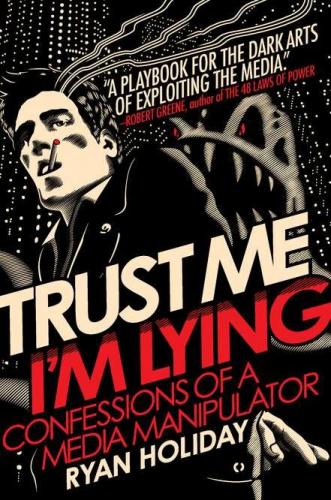 One of the more interesting exposes of the media business is Trust Me. I’m Lying: Confessions of a Media Manipulator, by Ryan Holiday, who became fed up with the games at which he was a master well before his 30th birthday. We swim in an ocean of this stuff, so books describing propaganda techniques are not new. However, Holiday presents his rules for feeding and tricking reporters, beginning with bloggers.
One of the more interesting exposes of the media business is Trust Me. I’m Lying: Confessions of a Media Manipulator, by Ryan Holiday, who became fed up with the games at which he was a master well before his 30th birthday. We swim in an ocean of this stuff, so books describing propaganda techniques are not new. However, Holiday presents his rules for feeding and tricking reporters, beginning with bloggers.
Commercial media live on advertising, so drawing viewers often trumps careful investigation. In the case of on-line blogs, success is page hits, and short pieces that require clicking to another page expose more ads. Most freelance bloggers are paid a pittance per page, a piece rate pay system, so they have to grind out copy. To get more work their presentations have to grab eyeballs, and time for fact checking is limited.
Excitement is compelling: gore, sex, snarky writing, whatever. Many bloggers are open to manipulators that help them get hits. Among a number of rules for this is to give bloggers tips on stories that might go viral. That’s a big win in this game.
Inciting anger is the surest way to hook an audience. Never mind shaky facts; go for viral bombs. In addition, old-line media must now race to break a story, so even they hardly check first reports at all. The early news on the Newtown school shootings is an obvious example.
Anger makes viewers oblivious to credibility. Whether a protest drew a crowd of 500,000 or was a staged event with 10 people, if some antic draws a camera and goes viral, it is a success. Experts manipulating this system can manufacture excitement over trivial events – or even non-events. By contrast, events like attention-seeking award ceremonies that are important to a few people are bereft of anger. Seeing no antics and no scandal, almost everyone not involved will tune out – too boring.
Want to pretend to be an expert for a reporter? Sign up for Help a Reporter Out. Many imposters do. We may “sense” that the standards of reporting have declined in the last two decades, but digging into this muck shows that the processes some reporters use practically invite misinformation and distraction to feed the attention monster.
Fortunately, Ryan ends his sorry tale with the equivalent of a tenet of Compression: quality over quantity, always. However, that’s dull. Only people taking the time to be reflective are apt to gravitate to it.
